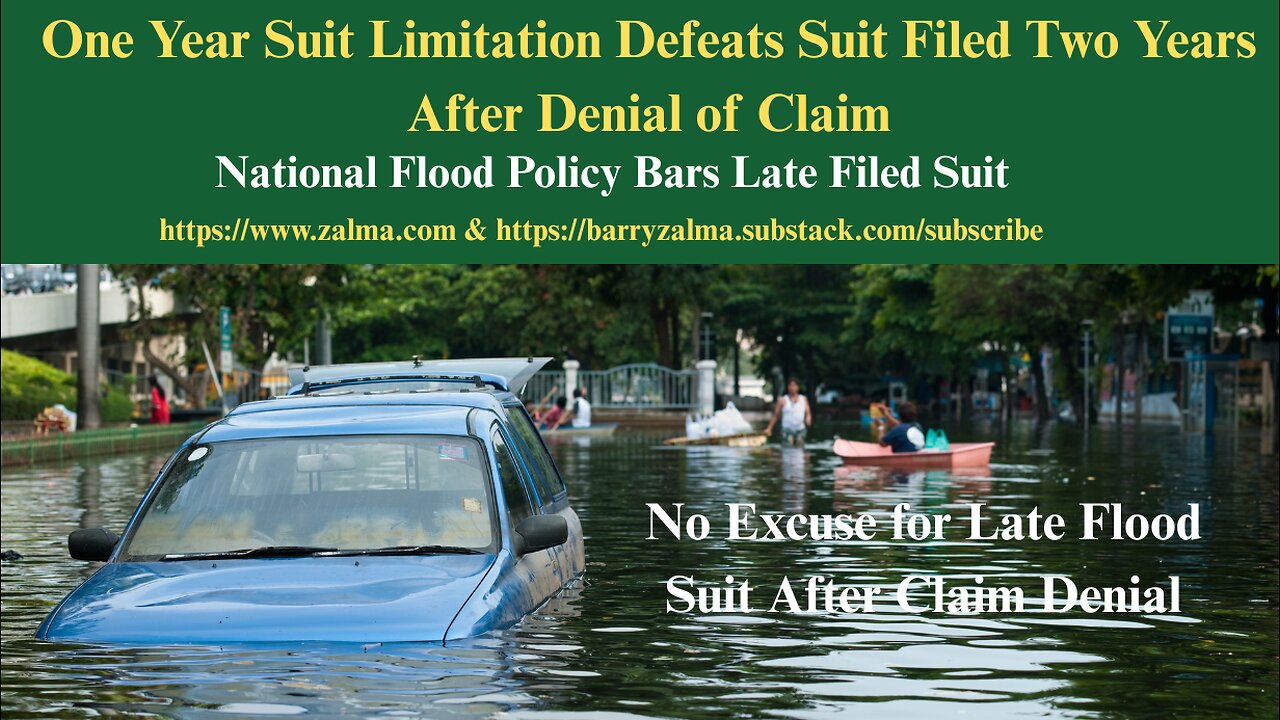Premium Only Content

One Year Suit Limitation Defeats Suit Filed Two Years After Denial of Claim
National Flood Policy Bars Late Filed Suit
Post 5221
No Excuse for Late Flood Suit After Claim Denial
In Domenico D'ambrosio, Michele D'ambrosio v. American Bankers Insurance Company Of Florida, No. 2:25-cv-155-KCD-NPM, United States District Court, M.D. Florida, Fort Myers Division (October 7, 2025)
This is an insurance dispute stemming from Hurricane Ian. Plaintiffs Domenico and Michelle D'Ambrosio submitted a flood claim that Defendant American Bankers Insurance Company of Florida will not pay. To recover the funds allegedly owed, Plaintiffs sued for breach of contract.
Defendant's moved to dismiss under Fed.R.Civ.P. 12(b)(6). Defendant presses one argument: “Plaintiffs failed to bring their lawsuit . . . within one year from the date of [the] partial denial of [their] flood insurance claim.”
A standard flood insurance policy, like here, is provided under the terms of the National Flood Insurance Act of 1968 and its Amendments, and Title 44 of the Code of Federal Regulations.
The regulations require a claimant to file suit “within one year after the date of mailing of notice of disallowance or partial disallowance” of the claim. 42 U.S.C. § 4072; see also 44 C.F.R. § 62.22(a).
According to the complaint, Plaintiffs submitted their flood claim shortly after Hurricane Ian. Then, on December 19, 2022, Defendant issued a partial payment. The correspondence making payment also denied a portion of the claim by stating: “We denied a portion of your claim based upon the applicable provisions of the Standard Flood Insurance Policy (SFIP), as set forth below.”
Plaintiffs filed suit on February 26, 2025, so this case is seemingly several years too late. A denial letter is a proper disallowance that triggers the one-year limitation period.
Generally, only the four corners of the complaint may be considered in ruling on a motion to dismiss pursuant to Rule 12(b)(6). But there are several exceptions to this rule. The Court agreed with Defendant-the December 2022 denial letter fits squarely within the incorporation-by-reference doctrine. It is central to Plaintiffs' case because it is the denial they seek to challenge. The letter's authenticity is also unchallenged.
Defendant's denial letter triggered the one-year limitations period. This case, filed over two years later, is time-barred. Accordingly, it was ORDERED:
Defendant's Motion to Dismiss is GRANTED; and
Plaintiffs' complaint was DISMISSED WITH PREJUDICE.
ZALMA OPINION
It is axiomatic that an insurance policy, like the National Flood Insurance policy issued to the plaintiffs , contains an enforceable one year private limitation of action provision which provision, in every jurisdiction in the US, is enforceable. The NFPA condition is not waiveable and even if the Plaintiffs tried to allege the waiver there was no facts supporting the waiver. The Plaintiffs are not without a remedy, they may consider seeking indemnity from their lawyers who failed to file suit timely.
(c) 2025 Barry Zalma & ClaimSchool, Inc.
Please tell your friends and colleagues about this blog and the videos and let them subscribe to the blog and the videos.
Subscribe to my substack at https://barryzalma.substack.com/subscribe
Go to X @bzalma; Go to Barry Zalma videos at Rumble.com at https://rumble.com/account/content?type=all; Go to Barry Zalma on YouTube- https://www.youtube.com/channel/UCysiZklEtxZsSF9DfC0Expg; Go to the InsuranceClaims Library – https://lnkd.in/gwEYk.
-
 9:59
9:59
Insurance Law
8 days agoNo Unjust Enrichment When Insurer Overpays Claim
351 -
 2:16:43
2:16:43
TheSaltyCracker
6 hours agoIt's Over Zelensky ReeEEStream 11-21-25
81.3K131 -
 4:50:37
4:50:37
Drew Hernandez
1 day agoMIKE HUCKABEE EXPOSED FOR OFF RECORD MEETING WITH CONVICTED ISRAELI SPY?
46.4K22 -
 4:07:43
4:07:43
SynthTrax & DJ Cheezus Livestreams
17 hours agoFriday Night Synthwave 80s 90s Electronica and more DJ MIX Livestream SYNTHWAVE / ANIME NIGHT
33.5K1 -
 14:25
14:25
Tactical Advisor
15 hours agoReal Life John Wick Suit | Grayman & Company
21.4K2 -
 LIVE
LIVE
I_Came_With_Fire_Podcast
15 hours agoAlien Enemies Act | Dismantling the Department of Education | Valhalla VFT & America First
287 watching -
 19:53
19:53
MetatronHistory
6 hours agoRome VS Greece - Ultimate Clash of Civilizations Explained
12.3K4 -
 33:09
33:09
Exploring With Nug
8 hours ago $5.71 earnedThey Weren’t Ready for Nightfall on Blood Mountain… So I Helped Them Down
31.6K1 -
 1:16:42
1:16:42
Sarah Westall
6 hours agoBoardroom and Government Infiltration: The Silent Erosion of American Power w/ Mike Harris
19.8K5 -
 4:17:52
4:17:52
JahBlessCreates
4 hours ago🎉WE BACK!! MUSIC | VIBES | GAMES
4.35K1